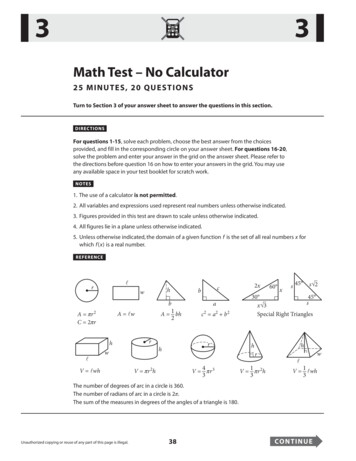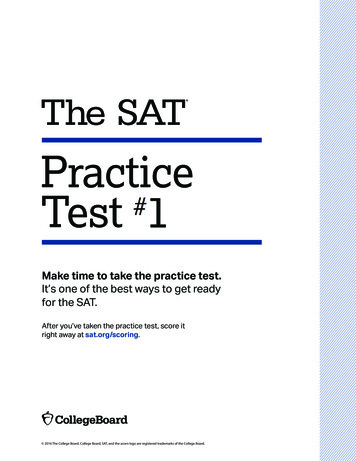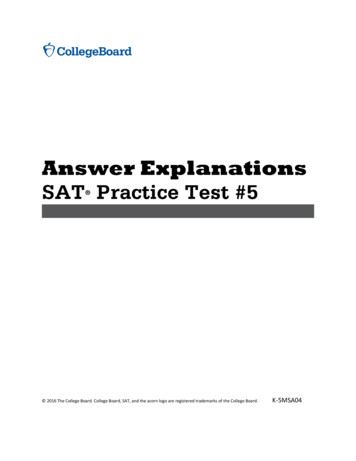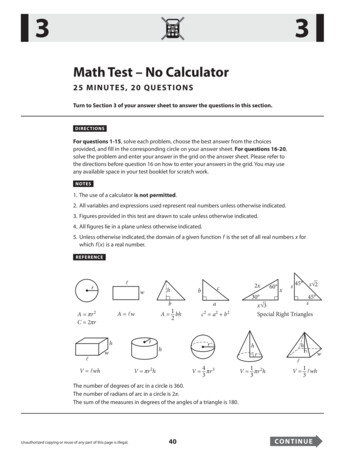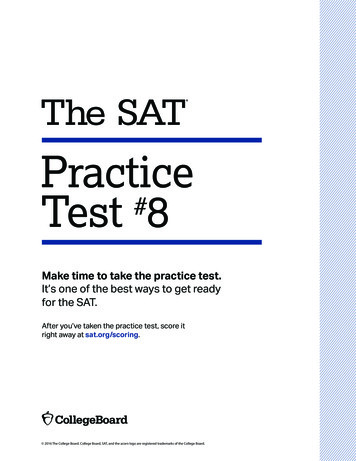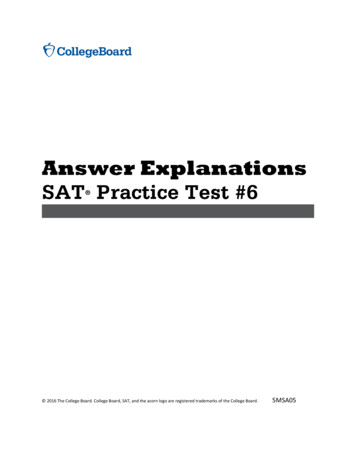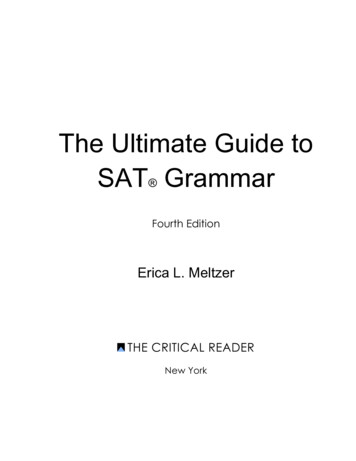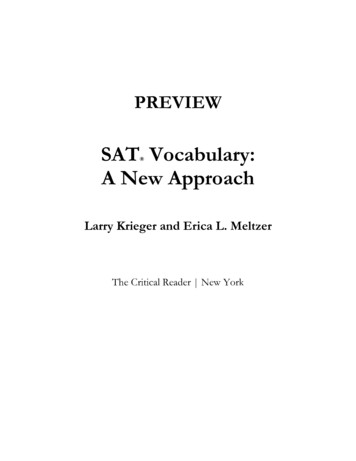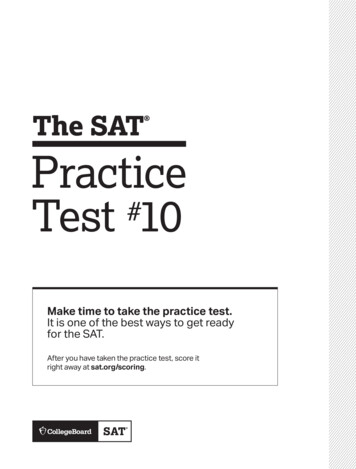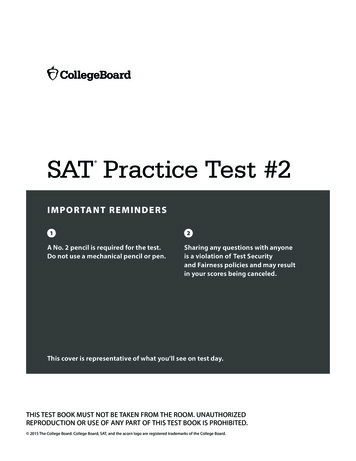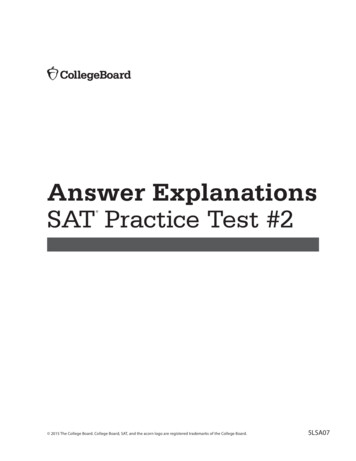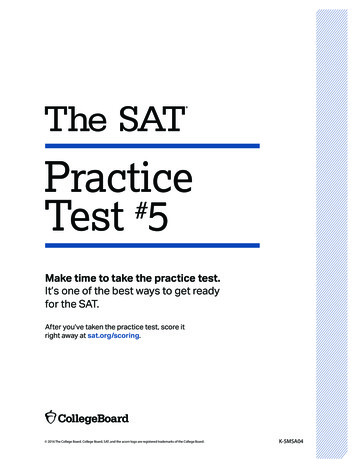
Transcription
Practice#Test 5Make time to take the practice test.It’s one of the best ways to get readyfor the SAT.After you’ve taken the practice test, score itright away at sat.org/scoring. 2016 The College Board. College Board, SAT, and the acorn logo are registered trademarks of the College Board.K-5MSA04
Test begins on the next page.
11Reading Test65 M I NU TES, 5 2 QUESTIONSTurn to Section 1 of your answer sheet to answer the questions in this section.Each passage or pair of passages below is followed by a number of questions. After readingeach passage or pair, choose the best answer to each question based on what is stated orimplied in the passage or passages and in any accompanying graphics (such as a table orgraph).This passage is adapted from William Maxwell, The FoldedLeaf. 1959 by William Maxwell. Originally publishedin 1945.Line510152025The Alcazar Restaurant was on Sheridan Roadnear Devon Avenue. It was long and narrow, withtables for two along the walls and tables for fourdown the middle. The decoration was art moderne,except for the series of murals depicting the fourseasons, and the sick ferns in the front window.Lymie sat down at the second table from the cashregister, and ordered his dinner. The history book,which he propped against the catsup and the glasssugar bowl, had been used by others before him.Blank pages front and back were filled in with maps,drawings, dates, comic cartoons, and organs of thebody; also with names and messages no longer clearand never absolutely legible. On nearly every otherpage there was some marginal notation, either in inkor in very hard pencil. And unless someone hadupset a glass of water, the marks on page 177 werefrom tears.While Lymie read about the Peace of Paris, signedon the thirtieth of May, 1814, between France andthe Allied powers, his right hand managed again andagain to bring food up to his mouth. Sometimes hechewed, sometimes he swallowed whole the food thathe had no idea he was eating. The Congress ofVienna met, with some allowance for delays, early inNovember of the same year, and all the powersengaged in the war on either side sentUnauthorized copying or reuse of any part of this page is illegal.Questions 1-10 are based on the followingpassage.230354045505560plenipotentiaries. It was by far the most splendid andimportant assembly ever convoked to discuss anddetermine the affairs of Europe. The Emperor ofRussia, the King of Prussia, the Kings of Bavaria,Denmark, and Wurttemberg, all were present inperson at the court of the Emperor Francis I in theAustrian capital. When Lymie put down his fork andbegan to count them off, one by one, on the fingersof his left hand, the waitress, whose name was Irma,thought he was through eating and tried to take hisplate away. He stopped her. Prince Metternich (hisright thumb) presided over the Congress, andPrince Talleyrand (the index finger) representedFrance.A party of four, two men and two women, cameinto the restaurant, all talking at once, and tookpossession of the center table nearest Lymie.The women had shingled hair and short tight skirtswhich exposed the underside of their knees whenthey sat down. One of the women had the face of ayoung boy but disguised by one trick or another(rouge, lipstick, powder, wet bangs plastered againstthe high forehead, and a pair of long pendentearrings) to look like a woman of thirty-five, whichas a matter of fact she was. The men were older. Theylaughed more than there seemed any occasion for,while they were deciding between soup and shrimpcocktail, and their laughter was too loud. But it wasthe women’s voices, the terrible not quite sober pitchof the women’s voices which caused Lymie to skimover two whole pages without knowing what was onthem. Fortunately he realized this and went back.Otherwise he might never have known about theCO NTI N U E
170758085901Over the course of the passage, the primary focusshifts fromA) Lymie’s inner thoughts to observations made bythe other characters.B) an exchange between strangers to a satisfyingpersonal relationship.C) the physical setting of the scene to the differentcharacters’ personality traits.D) Lymie’s experience reading a book todescriptions of people in the restaurant.Unauthorized copying or reuse of any part of this page is illegal.65secret treaty concluded between England, France,and Austria, when the pretensions of Prussia andRussia, acting in concert, seemed to threaten arenewal of the attack. The results of the Congresswere stated clearly at the bottom of page 67 and atthe top of page 68, but before Lymie got halfwaythrough them, a coat that he recognized as hisfather’s was hung on the hook next to his chair.Lymie closed the book and said, “I didn’t think youwere coming.”Time is probably no more unkind to sportingcharacters than it is to other people, but physicaldecay unsustained by respectability is somehow morenoticeable. Mr. Peters’ hair was turning gray and hisscalp showed through on top. He had lost weightalso; he no longer filled out his clothes the way heused to. His color was poor, and the flower haddisappeared from his buttonhole. In its place was anAmerican Legion button.Apparently he himself was not aware that therehad been any change. He straightened his tieself-consciously and when Irma handed him a menu,he gestured with it so that the two women at the nexttable would notice the diamond ring on the fourthfinger of his right hand. Both of these things, andalso the fact that his hands showed signs of themanicurist, one can blame on the young man whohad his picture taken with a derby hat on the back ofhis head, and also sitting with a girl in the curve ofthe moon. The young man had never for one seconddeserted Mr. Peters. He was always there, tugging atMr. Peters’ elbow, making him do things that werenot becoming in a man of forty-five.132The main purpose of the first paragraph is toA) introduce the passage’s main character byshowing his nightly habits.B) indicate the date the passage takes place bypresenting period details.C) convey the passage’s setting by describing a placeand an object.D) foreshadow an event that is described in detaillater in the passage.3It can reasonably be inferred that Irma, the waitress,thinks Lymie is “through eating” (line 37) becauseA) he has begun reading his book.B) his plate is empty.C) he is no longer holding his fork.D) he has asked her to clear the table.4Lymie’s primary impression of the “party of four”(line 42) is that theyA) are noisy and distracting.B) are a refreshing change from the othercustomers.C) resemble characters from his history book.D) represent glamour and youth.5Which choice provides the best evidence for theanswer to the previous question?A) Lines 45-47 (“The women . . . down”)B) Lines 47-52 (“One . . . was”)C) Lines 55-59 (“But . . . them”)D) Line 69 (“Lymie . . . book”)CO NTI N U E
1The narrator indicates that Lymie finally closes thehistory book becauseA) his father has joined him at the table.B) the people at the other table are too disruptive.C) he has finished the chapter about the Congress.D) he is preparing to leave the restaurant.7The primary impression created by the narrator’sdescription of Mr. Peters in lines 74-79 is that he isA) healthy and fit.B) angry and menacing.C) nervous and hesitant.D) aging and shriveled.Unauthorized copying or reuse of any part of this page is illegal.6148The main idea of the last paragraph is that Mr. PetersA) neglects to spend any time with his familymembers.B) behaves as if he is a younger version of himself.C) is very conscious of symbols of wealth andpower.D) is preoccupied with the knowledge that he isgrowing old.CO NTI N U E
1Which choice best supports the conclusion thatMr. Peters wants to attract attention?A) Lines 80-81 (“Apparently . . . change”)B) Lines 81-85 (“He straightened . . . hand”)C) Lines 90-91 (“The young . . . Mr. Peters”)D) Lines 91-93 (“He was . . . forty-five”)Unauthorized copying or reuse of any part of this page is illegal.91510As used in line 93, “becoming” most nearly meansA) emerging.B) fitting.C) developing.D) happening.CO NTI N U E
1Passage 1 is adapted from Catharine Beecher, Essay onSlavery and Abolitionism. Originally published in 1837.Passage 2 is adapted from Angelina E. Grimké, Letters toCatharine Beecher. Originally published in 1838. Grimkéencouraged Southern women to oppose slavery publicly.Passage 1 is Beecher’s response to Grimké’s views.Passage 2 is Grimké’s response to Beecher.Passage 1Line510152025303540Heaven has appointed to one sex the superior,and to the other the subordinate station, and thiswithout any reference to the character or conduct ofeither. It is therefore as much for the dignity as it isfor the interest of females, in all respects to conformto the duties of this relation. . . . But while womanholds a subordinate relation in society to the othersex, it is not because it was designed that her dutiesor her influence should be any the less important, orall-pervading. But it was designed that the mode ofgaining influence and of exercising power should bealtogether different and peculiar. . . .A man may act on society by the collision ofintellect, in public debate; he may urge his measuresby a sense of shame, by fear and by personal interest;he may coerce by the combination of publicsentiment; he may drive by physical force, and hedoes not outstep the boundaries of his sphere. But allthe power, and all the conquests that are lawful towoman, are those only which appeal to the kindly,generous, peaceful and benevolent principles.Woman is to win every thing by peace and love;by making herself so much respected, esteemed andloved, that to yield to her opinions and to gratify herwishes, will be the free-will offering of the heart. Butthis is to be all accomplished in the domestic andsocial circle. There let every woman become socultivated and refined in intellect, that her taste andjudgment will be respected; so benevolent in feelingand action; that her motives will be reverenced;—sounassuming and unambitious, that collision andcompetition will be banished;—so “gentle and easy tobe entreated,” as that every heart will repose in herpresence; then, the fathers, the husbands, and thesons, will find an influence thrown around them,to which they will yield not only willingly butproudly. . . .A woman may seek the aid of co-operation andcombination among her own sex, to assist her in herappropriate offices of piety, charity, maternal andUnauthorized copying or reuse of any part of this page is illegal.Questions 11-21 are based on the followingpassages.1645domestic duty; but whatever, in any measure, throwsa woman into the attitude of a combatant, either forherself or others—whatever binds her in a partyconflict—whatever obliges her in any way to exertcoercive influences, throws her out of herappropriate sphere. If these general principles arecorrect, they are entirely opposed to the plan ofarraying females in any Abolition movement.Passage 25055606570758085The investigation of the rights of the slave has ledme to a better understanding of my own. I havefound the Anti-Slavery cause to be the high school ofmorals in our land—the school in which humanrights are more fully investigated, and betterunderstood and taught, than in any other. Here agreat fundamental principle is uplifted andilluminated, and from this central light, raysinnumerable stream all around.Human beings have rights, because they are moralbeings: the rights of all men grow out of their moralnature; and as all men have the same moral nature,they have essentially the same rights. These rightsmay be wrested from the slave, but they cannot bealienated: his title to himself is as perfect now, as isthat of Lyman Beecher:1 it is stamped on his moralbeing, and is, like it, imperishable. Now if rights arefounded in the nature of our moral being, then themere circumstance of sex does not give to man higherrights and responsibilities, than to woman. Tosuppose that it does, would be to deny theself-evident truth, that the “physical constitution isthe mere instrument of the moral nature.” Tosuppose that it does, would be to break up utterly therelations, of the two natures, and to reverse theirfunctions, exalting the animal nature into a monarch,and humbling the moral into a slave; making theformer a proprietor, and the latter its property.When human beings are regarded as moralbeings, sex, instead of being enthroned upon thesummit, administering upon rights andresponsibilities, sinks into insignificance andnothingness. My doctrine then is, that
2016 The College Board. College Board, SAT, and the acorn logo are registered trademarks of the College Board. Practice Test #5 Make time to take the practice test. It’s one of the best ways to get
